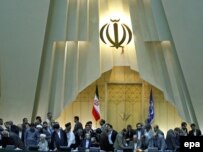Iranian parliamentary body scraps polygamy proposal
| Publisher | Radio Free Europe/Radio Liberty |
| Publication Date | 9 September 2008 |
| Cite as | Radio Free Europe/Radio Liberty, Iranian parliamentary body scraps polygamy proposal, 9 September 2008, available at: https://www.refworld.org/docid/48cf7c93c.html [accessed 20 May 2023] |
| Disclaimer | This is not a UNHCR publication. UNHCR is not responsible for, nor does it necessarily endorse, its content. Any views expressed are solely those of the author or publisher and do not necessarily reflect those of UNHCR, the United Nations or its Member States. |
September 09, 2008
 Iran's parliament, the Majlis
Iran's parliament, the Majlis
TEHRAN (Reuters) – An Iranian parliamentary committee has thrown out a government proposal that women's rights activists feared would have encouraged polygamy in the Islamic Republic, media have reported.
"It is a very positive move," campaigner Sussan Tahmasebi said of the decision by the Legal and Judicial Committee to change the bill on families. "We think it is great that parliament listened to women's voices," she told Reuters.
Activists had lobbied against the measure, which they said would have allowed a man to take a new wife without the consent of the first one. The bill also covered other family issues and parliament is now expected to vote on the amended version.
The conservative-controlled legislature was originally due to debate the Bill to Protect the Family last week, but it was sent back to the committee for more work after it caused controversy.
Newspapers quoted committee Chairman Ali Shahrokhi as saying it had removed two articles that had angered activists and others – one dealing with polygamy and another on taxing money the husband agrees to pay his wife under a marriage contract.
Under Iran's Islamic law, men can have up to four wives but many Iranians see polygamy as unacceptable and it is not common.
Shahrokhi said families would have been "exposed to collapse" under the proposal on polygamy, which critics say would only require a man to get a court decision showing he has the financial means in order to take a second wife.
"We did not see this article as logical and we deleted it," the daily "Etemad" quoted him as saying. "Iranian families and women should know that we are not indifferent to their issues."
Taboo
The government rejects allegations that Iran discriminates against women. Its spokesman, Gholamhussein Elham, this week warned that if the bill was rejected, polygamy would "be implemented without any rule or regulation."
Tehran sociology professor Hamidreza Jalaiepour said the draft law had proved controversial also among conservatives, who form the most powerful faction in Iranian politics after hard-liner Mahmud Ahmadinejad won the presidency in 2005.
Polygamy is socially taboo for many middle-class people in urban areas, Jalaiepour said. The practice is not widespread in cities but more accepted in some rural areas, he added.
Tahmasebi described the move to amend the bill as a major victory but said campaigners still had problems with other aspects of it, for example on women marrying non-Iranians.
She said she now hoped for a "positive dialogue" with lawmakers on this and other issues affecting women in Iran.
Tahmasebi is involved in a campaign to collect 1 million signatures in support of improving women's rights in Iran.
Campaigners say dozens of them have been detained since the drive began in 2006 in what Western diplomats see as part of a wider clampdown on dissent. Most were freed within days.
The activists say women in Iran face institutionalized discrimination that makes them second-class citizens in divorce, inheritance, child custody, and other aspects of life.
Iran's ruling clerics say Iranian women are protected from the sex-symbol status they have in the West and that the country is implementing divine law.
